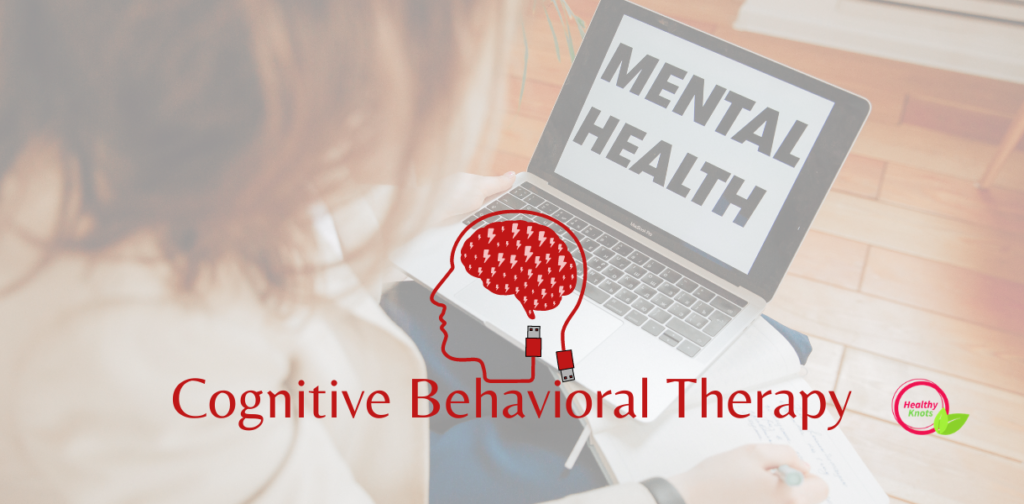Cognitive behavioral therapy or CBT is a type of psychological treatment. It helps mental health professionals to treat cognitive distortion in their patients. As the name suggests, cognitive behavioral therapy is a talk therapy that revolves around correcting errors in thinking.
The main goal of cognitive behavioral therapy (CBT) is helping an individual to understand the factual errors in their thought process. It helps in making people aware of the errors in their logic that lead them to a destructive or damaging conclusion about themselves. Cognitive behavioral therapy is extremely helpful in treating many mental illnesses and disorders. Given below are few major mental illnesses that CBT can help with:
- Anxiety and Stress disorder
- Depression
- Post-traumatic stress disorder
- Borderline personality disorder (BPD)
Bipolar disorder
Table of Contents
What is Cognitive Distortion
Cognitive distortions are basically habitual errors in someone’s thought process that strengthen their negative emotions. These negative emotions can often lead people towards damaging or hateful conclusions about themselves.
Such error in thought process can occur in anyone. But it becomes severe in individuals with mental health illness. According to a 2017 study published in Pubmed, there is a clear relationship between harsh life conditions and cognitive distortions.
There are many types of cognitive distortion:
Black and white thinking: In this kind of thinking, there is no middle ground. The thought process always leads to extreme conclusions. It is also called “All or Nothing”mindset. The person with such issues sees situations in black and white light. For them, a situation is either all good or all bad. Due to low self-esteem, people with such cognitive distortion usually conclude an all bad narrative about their life situation.
Overgeneralization: This kind of distortion leads people to overgeneralize a simple event. One adverse situation may lead to a generalized negative conclusion. In a 2015 study published, overgeneralization was found to be connected with post-traumatic stress disorder (PTSD).
Catastrophizing: This type of distortive thinking leads people to maximize or minimize the importance of an event. For example, a big achievement may seem least significant or a small mess-up may lead to the worst conclusion. This is also called the binocular trick.
Personalization: This is the most common cognitive distortion. Most people often seem to take things personally that may not even be remotely connected to them. Often this kind of error makes people take the blame on themselves in situations where they had no control.
How cognitive behavioral therapy (CBT) helps with cognitive distortion
Cognitive behavioral therapy is specialized psychotherapy that helps to correct these kinds of distortions in thinking. This therapy leads to interpret events rationally. Cognitive behavioral therapy focuses on the situations at hand instead of looking for a generalized conclusion. CBT helps to correct the way of thinking by making people question their conclusion.
This therapy is based on the belief that the human mind can be trained to think of positive thoughts. Cognitive behavioral therapy is largely based on the philosophy Epictetus.
Philosophy of Epictetus
The founder of cognitive behavioral therapy (CBT) Dr. Albert Ellis was influenced by the Greek philosopher Epictetus. Epictetus believed that positive or negative reaction towards an event can often lead to a happy or adverse life situation.
“It’s not what happens to you, but how you react to it that matters.”
-Epictetus.
The human mind is similar to complex machinery. It is difficult to understand what a mind can perceive of a certain situation.
However, Epictetus believed that human minds can be trained to think of happy thoughts and thus bring positive changes even in an adverse situation. He believed that humans can be led to think rationally by questioning a conclusion with logic. According to Epictetus, understanding what can or cannot be controlled in a situation often leads to a better conclusion. Dr. Albert Ellis developed cognitive behavioral therapy specifically on this philosophy of Epictetus.
How cognitive behavioral therapy works
As mentioned above, due to cognitive errors in thinking people tend to have a negative bias against themselves. There are multiple strategies of cognitive behavioral therapy (CBT) that work towards correcting such errors. Thus, finally changing the perception of individuals.
Analyze the situation
In this, a therapist works with their patient to understand the mindset and the logical reasoning the patient is using in their life situations. This makes the therapist aware of all the issues in the patient’s thought process.
Identify the problem
In this stage,the therapist leads their patient in understanding the problems in their thinking. They work together to identify the irrational thoughts and the cognitive distortions in the patient’s mind. In this stage, the therapist encourages a patient to spend time analyzing any of their past negative conclusion and check if the conclusions were rational or logical.
Practice Rational thinking
Once the patient is able to identify the types of thought distortion they have, the therapist can guide them towards correcting these errors. In this stage, the therapist helps their patients in understanding their usual thought processes before coming to a polarized conclusion.
Learn the changes
In this final stage, the therapist and patient work closely to make the rational changes in thinking permanent. This helps the patients to analyze every situation with logic and come to conclusions that are not driven by cognitive distortions.
These are the four primary stages of cognitive behavioral therapy (CBT), but they are not always the only way of guiding an individual with cognitive distortion. It depends on the evaluation done by the therapist on how to proceed further.
Take away
Cognitive behavioral therapy (CBT)has largely helped to treat patients with severe mental disorders as well as helping people in handling stressful situations. Cognitive behavioral therapy encourages people to change their perception by questioning themselves.
This often leads people to conclude contradictory statements to their initial conclusion. Thus, cognitive behavioral therapy helps them in understanding and identifying the error in their thinking.
However, cognitive behavioral therapy has some disadvantages. Cognitive behavioral therapy (CBT) is a time-consuming process. It demands persistence and commitment towards analyzing thought processes. This may not always be useful in extremely stressful situations for people with mental illness.
Also, due to its structured complexity cognitive behavioral therapy (CBT) may not be very useful in people with learning disabilities or with complex mental illnesses such as paranoia, schizophrenia, etc.
Some therapists mention that cognitive behavioral therapy (CBT) tends to work on the situation at hand instead of analyzing the underlying issues that are causing the cognitive distortion.


